Finland
Factsheet
| ETHNIC MINORITIES: | |
|
Swedish: Russian: Roma: |
5.6% 0.5% 0.2% |
| RELIGIONS: | |
|
Lutheran: Orthodox: Muslim: |
82.5% 1.1% 0.8% |
| NET MIGRATION: | 72,634 |
| POP. GROWTH RATE: | +0.5% |
| GDP GROWTH: | -0.6% |
| GDP PER CAPITA: | 45,721 |
| UNEMPLOYMENT: | 8.2 |
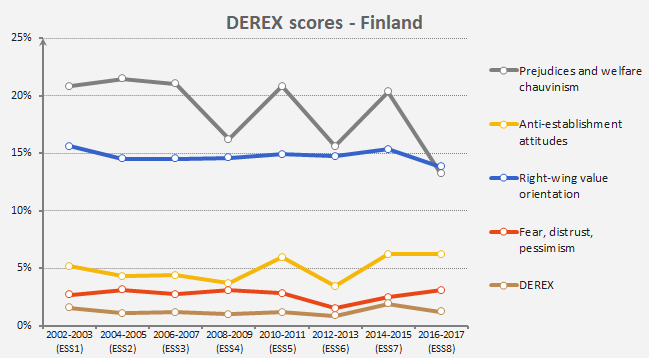
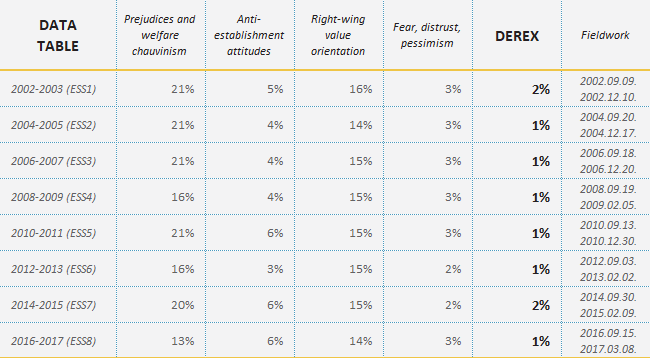
True Finns (Perussuomalaiset, PS)
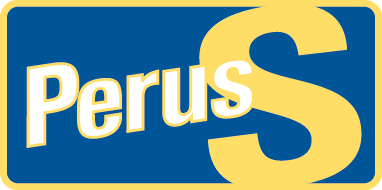
The True Finns party (Perussuomalaiset, PS), commonly referred to as The Finns Party since August 2011, wasfounded in 1995 as a spin-off group of the dissolved Finnish Rural Party. Theyreceived 17,7per cent of the votes in the most recent parliamentary elections in April2015, following a result of 19% from four years before in 2011. While their rise was aided by an electoral scandal that sidetracked the major parties, their success is unmistakably linked to the populist appeal of their fundamental message: why should fiscally responsible northerners be forced to subsidize the reckless budgetary antics of unscrupulous and incompetent southerners? The PS offers a political home for Finnish Eurosceptics railing against European integration and bailouts to southern European states. Like other Scandinavian populist movements, the PS defies the traditional left–right dichotomy, uniting left-wing economic policies with right-wing social policies. The party opposes same-sex marriage and adoption, and advocates a much more nationalist array of educational policies, wanting students to learn less Swedish and more about traditional Finnish values. PS’s immigration policy, one of its showcase agendas, centers on proposals to deport immigrants who have committed crimes; to take no more refugees than required by quotas; but also to permit immigrants who have a clean criminal record, knowledge of the Finnish language, and steady employment to become Finnish nationals after five years. Timo Soini, the PS leader, was the party’s presidential candidate in 2006, and today is a popular member of the European Parliament — elected with the highest vote share of any candidate in Finland.
In the past few years support for the party has significantly increased. While in the 2007 general election it received only 4.05% of the votes, by 2011 it became the third most successful party with 19.1%. Theparty held onto its leading role; achieving 17.7% of votes in April 2015 and, due to an increased number of municipal mandates, it became the second largest party in Parliament with 38 seats out of 200. The liberal/conservative National Coalition Party attained very similar results with 18.2% of votes and 37 mandates. In respect to the EP electionsin May 2014the PS was the third most popular force with a weaker, 12.9%backing. The party's leader, Timo Soini, rejects both the European Union and NATO over national sovereignty and neutrality. The organization's EP campaign addresses a number of topics: it emphasizes the importance of national sovereignty as opposed to migration, stands firmly against delegating legislative and financial decisions to the EU and describes the effects of European directives and the Euro on the Finnish economy as detrimental.
After the April 2015 election, the True Finns entered Juha Sipilä’s coalition government together with the Centre Party and the National Coalition Party, which was key to a subsequent diminution of their support. From October 2015 to the first half of 2016, opinion polls predicted that only around 10% of all voters would unequivocally back The Finns Party, a development that can be attributed to a general perception that the party was unable to exercise any meaningful impact on the cabinet throughout the migrant crisis despite its strong anti-immigrant stance during the election campaign.
(Last update on 8. April, 2016)
PS on the Internet:
Sources:
- Jamie Bartlett et al.: “The New Face of Digital Populism.” Demos: London 2011, p. 107-108. Available online at http://www.demos.co.uk/files/Demos_OSIPOP_Book-web_03.pdf?1320601634
European elections - May 25, 2014
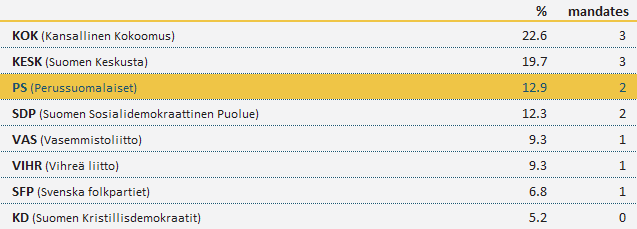

Parliamentary elections - April 17, 2011
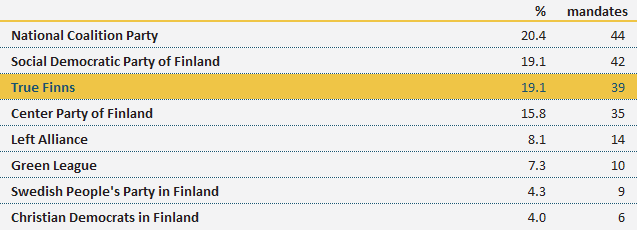

European elections - June 7, 2009
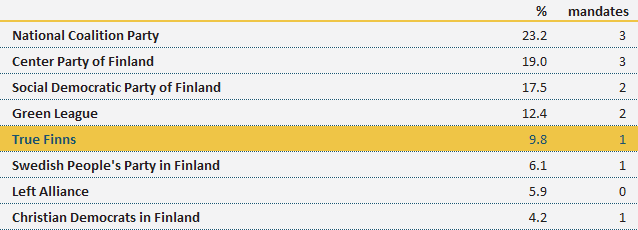

Parliamentary elections - March 18, 2007
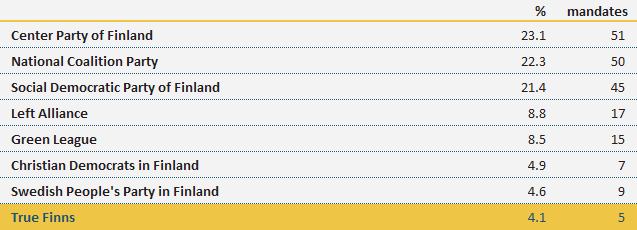
Source: Ministry of Justice; EP2014
Our thematic websites
Political Capital's analyses and activities in English.
Research and advocacy programme focused on the role conspiracy theorising plays in shaping populist and radical politics.
Our project New electoral system in Hungary: watchdogging, advocacy and raising awareness focuses on the electoral reform in Hungary.
Our blog on political and societal extremism and conspiracy theories.
DEREX website is supported by










